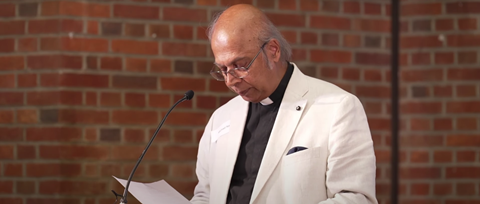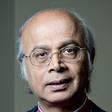Britain’s Christian heritage is being ignored, but there’s still time to “re-Christianise” the nation. That’s according to a number of prominent Christian leaders who have united to produce a new Westminster Declaration. One of the organisers, Msgr Dr Michael Nazir-Ali, explains what it’s all about and why he wants Christians to sign up

In 2010 Christian leaders from across the denominations made the Westminster Declaration of common Christian belief about what is important for our life together as a society. They also drew ‘red lines’ regarding Christian conscience on matters such as the protection and welfare of human life at every stage, the nature and proper use of the gift of sexuality in marriage, responsibility for the raising and nurture of children and other matters.
It was, once again, felt by a cross section of leaders that, in the light of important social and technological developments since then, a fresh Declaration needed to be made.
In preparation for this, there was sustained consultation, over several months, with leading stakeholders in special interest groups but also more widely. The gathering in late September in Westminster was designed so that the wider Christian constituency could hear and reflect on the concerns identified in the consultations and bring additional concerns which could form action points for the future.
At the close of a packed day, the new Declaration was read out in plenary and was received by acclamation.
The new 2025 Declaration is addressed to our government and to others in positions of authority, as well as to our fellow citizens.
For many centuries, moral and spiritual reflection in this nation has taken place within the Judaeo-Christian tradition, most clearly expressed in the Bible.
It seeks, first of all, to commit ourselves to and to promote the Common Good. This means that we are concerned not just for ourselves but for society as a whole.
We also need to protect Christian conscience in the light of medical, social and legislative developments that are taking place at breakneck speed. Most Christians, for example, believe that human life should be protected in the womb. But where does that leave Christian doctors, nurses and other medical workers in situations where abortions, even late term abortions, are being carried out? Does the law protect them only where the actual procedure is concerned or should protection be such that it extends to advice, preparation and even administration connected with the procedure?
Many of us are praying that the proposed assisted suicide legislation will not become law. If it does, however, what protections will there be not only for Christians working in hospitals, hospices, care homes and domestic situations but also for the institutions themselves? A large number of care homes for the elderly and the disabled are run by Christian organisations. Will they be exempt from a physician arriving on their doorstep to administer drugs leading to suicide to one of their residents? What duties of preparation and after care of relatives will they be expected to have?
We are concerned that technological change, in information technology, the media and medicine is taking place at such a rapid pace that moral and spiritual reflection on what is good for the individual and for society are being left far behind.
For many centuries, such moral and spiritual reflection in this nation has taken place within the Judaeo-Christian tradition, most clearly expressed in the Bible. It was developed over the years during times of war and peace, in times of plenty and also in times of scarcity, during stability but also change. We strongly urge that any provision for reflection regarding the changes taking place today and those projected to take place, should take full account of this tradition. This is a treasure we have received and the results of its neglect in the recent past are clearly shown in the social problems that we see all around us.
While we have critiqued certain legal and social developments, our aim has not been negative but it as been to make a positive contribution to the society in which we live. We seek nothing for ourselves that we do not also seek for our neighbour and for our families, communities and the nation.
We pray that even now God will guide us into paths of peace, mutual flourishing and care of the weakest in our midst.
Read and sign the declaration at 2025westminsterdeclaration.org



































No comments yet